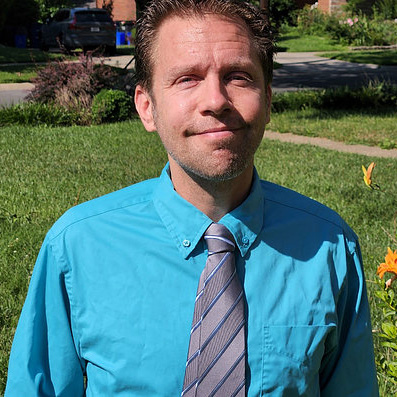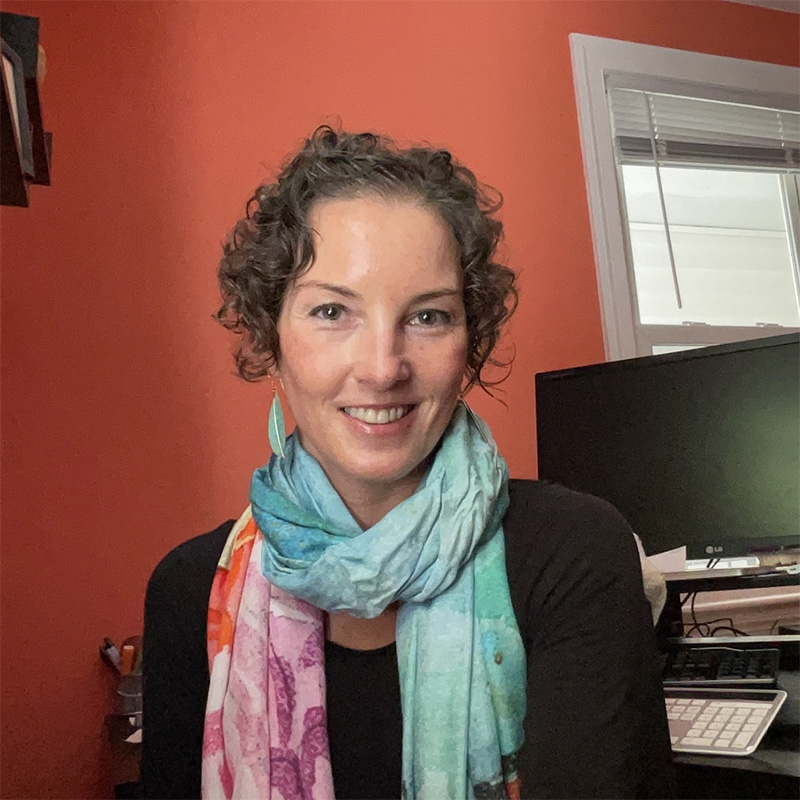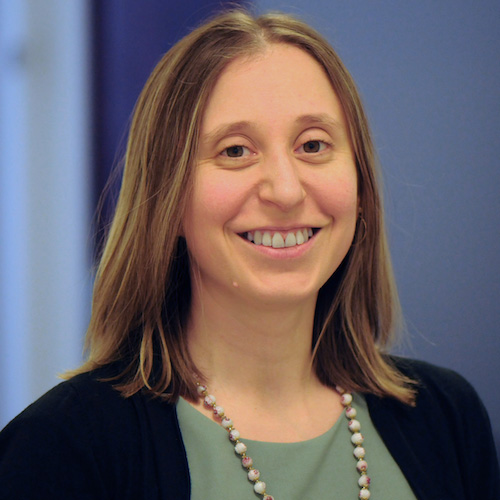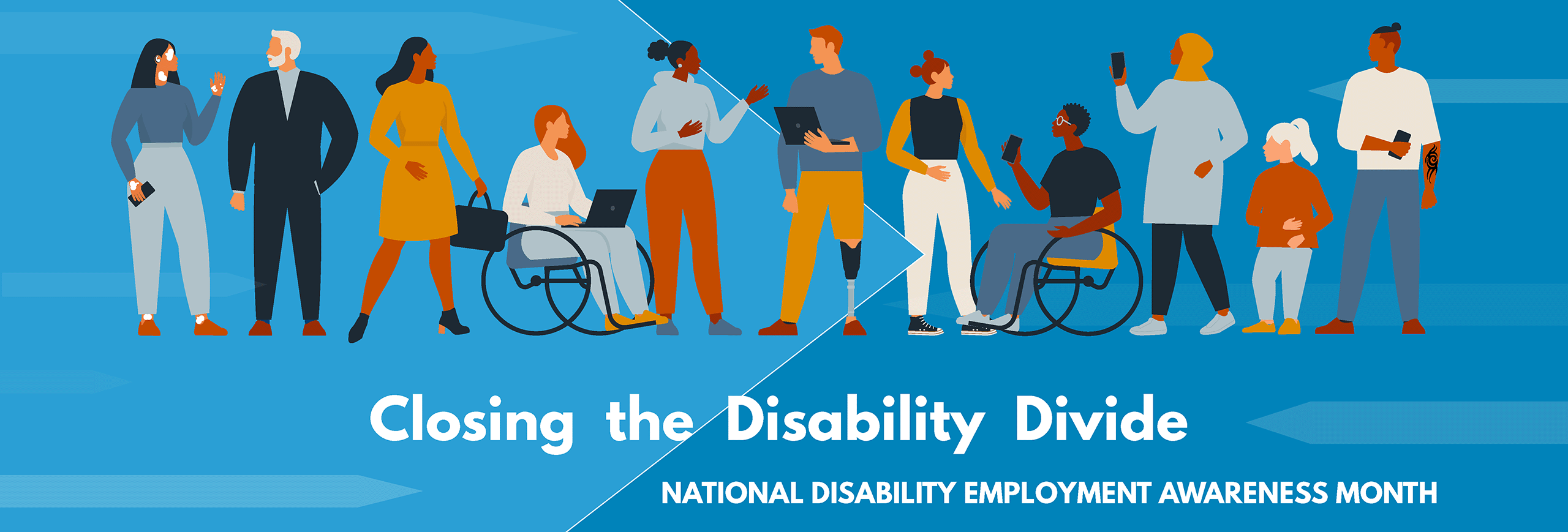NIH Champions and Allies of Disability Awardees
As the National Institutes of Health (NIH) recognizes October as National Disability Employment Awareness Month (NDEAM), we also want to honor those who encourage others by their example and demonstrate unconditional commitment, compassion, and understanding toward the disability community, as well as those who bring more of themselves into the workplace to make it more inclusive.

David Kosub, Ph.D.
David Kosub, Ph.D. is a biomedical scientist turned communicator and policy wonk. He strives to make the ins and outs of NIH and the research it supports understood by the wider community. This means that researchers, recipients of federal funds, elected leaders on the Hill, the press, advocates, and importantly, the general public all know more about the decisions made within our walls. Currently serving as the Senior Advisor for Congressional and Media Affairs with the NIH Office of Extramural Research, David helps the research community unlock the mysteries of "all things NIH grant policy.” He does so through channels such as coordinating the NIH Open Mike blog; hosting the NIH All About Grants podcast; answering questions that arise from reporters and legislators; strategizing on the message we want to tell; as well as sharing ideas with the general public (see this NIH Record article).
David’s spirit for information sharing bloomed while he earned a doctorate in Immunology from the University of Texas Southwestern Medical Center at Dallas studying HIV pathogenesis. When not at the bench, he took the opportunity to knock down barriers between citizens and science. A stronger relationship between the two could then be built showing how scientific advances and public policy decisions lead to changes in medicine and one’s health.
David is also passionate about ensuring persons with disabilities have a seat at the table, be they our fellow NIH employees or scientists performing the research we support. David is one of the original founding members of the NIH 3 Blind Mice, a group open to all NIH staff that is dedicated to sharing information and resources related to blindness and low vision. Among other activities, this group identifies accessibility software and other reasonable accommodations. NIH 3 Blind Mice advocates for best practices, equal access to programs, and efforts that enhance recruitment and retention, plus building and strengthening personal and professional relationships. David also serves on the working group developing the NIH-wide strategic plan on Diversity, Equity, Inclusion, and Accessibility ensuring that the needs, concerns, and ideas of fellow persons with disabilities are heard (see this NIH Record article). He strongly advocates for all of our NIH grants information to be accessible. David strives to shift the current paradigm from one where accessibility is an after-thought to one that is embraced throughout the entire life cycle of a project (see this NIH Record article). He values his allies in accessibility at NIH and beyond. Without them listening to his concerns and ideas to enhance pedestrian safety (especially for NIH staff who are blind or low vision), we would not have a controlled traffic walk signal installed at a busy street in front of an NIH leased facility.

Teresa Booher
Teresa Shea Booher joined the NIH in 2011. Since 2016, she has worked in the NIH Office of the Chief Information Officer (OCIO) as an Information Technology (IT) Specialist focused on IT governance, strategy, policy, and special projects.
Throughout her government service, Teresa has gone above and beyond her regular duties serving as a champion for disability awareness. Shortly after joining the NIH, she spearheaded the establishment of a blind and low-vision resource sharing group called 3 Blind Mice which she continues to lead today. She has served as a member of the NIH Disability Engagement Committee and supported the NIH Section 508 Program. Teresa has also been a featured speaker at NIH and across government. On a national scale, she is sharing her experiences and spotlighting the need for greater IT diversity, equity, inclusion, and accessibility (DEIA). Most recently, Teresa was selected by the NIH community of persons with disabilities to represent the group during the 2022 NIH DEIA Town Hall.
Throughout her career at NIH, Teresa has been recognized for her work in the IT space and contributions to DEIA with multiple Centers for Information Technology, the OCIO, and the NIH Director’s awards. In 2012, she was the recipient of the prestigious NIH Director’s Harvey J. Bullock Award highlighting her efforts for equal opportunity and fairness in the workplace. Though her primary focus is not exclusively in the area of DEIA, Teresa continues to prioritize true diversity, equity, inclusion, and accessibility for all people, including those with disabilities.

Dan Wheeland, P.E.
Dan Wheeland, P.E., has served as the Director of the Office of Research Facilities (ORF) for the National Institutes of Health since October 2006. He is responsible for the planning, design, construction, maintenance, utilities operation, acquisitions, and environmental stewardship of 274 owned buildings totaling 16.6 million gross square feet with a plant replacement value of $12 billion. He also oversees the administration of 41 leased buildings comprising 4 million rentable square feet. Mr. Wheeland received a bachelor’s degree in Civil Engineering from the University of Notre Dame, a master’s degree in construction management from the University of California at Berkeley, and a master’s degree in National Security Decision-making from the Naval War College. He is a graduate of the Wharton Executive Development Program. Prior to joining NIH, Dan served for 25 years in the US Navy Civil Engineer Corps.
His military decorations include two Legions of Merit, the Defense Meritorious Service Medal, three Meritorious Service Medals, the Navy Commendation Medal, the Navy Achievement Medal, and various unit awards. In 2015, President Obama conferred on Mr. Wheeland the rank of Meritorious Executive in the Senior Executive Service. He is a member of the American Society of Civil Engineers and a member of Chi Epsilon, the Civil Engineering Honor Society.

Lesley A. Earl, Ph.D.
Lesley A. Earl, Ph.D. is a science writer and Section 508 coordinator at the National Eye Institute (NEI) at the NIH. As a science writer, she communicates National Eye Institute (NEI) funded eye and vision research. As Section 508 coordinator, Dr. Earl facilitates and advocates for accessible digital communications for NEI staff and the public. She is particularly interested in expanding accessibility in video and multimedia for both scientific and general audiences. A key goal of the NEI is to drive innovative research to understand the eye and visual system, prevent and treat vision diseases, and expand opportunities for people who are blind or require vision rehabilitation.
Prior to joining NEI, Dr. Earl was a scientist and science writer in the National Cancer Institute’s intramural program. She earned a Ph.D. in cellular and molecular pathology from the University of California, Los Angeles.

Ellen Rolfes, M.A.
Ellen Rolfes was appointed as the Executive Officer (EO) of the National Human Genome Research Institute (NHGRI) at the NIH in 2014. As the EO, she is responsible for overseeing all aspects of administration for NHGRI. This includes ethics, financial management, acquisitions, and logistics, information technology management, management analysis and workforce planning, as well as general administration. Ellen is a human resources professional by training but is broadly accomplished in many other administrative areas. She received her Bachelor’s and Master’s degrees in Human Resources and serves on many trans-NIH committees, including the Management and Budget Working Group; the NIH Steering Committee Diversity Working Group; and the NIH Disability Engagement Committee.

Christopher Donohue, Ph.D.
Dr. Christopher Donohue is an historian at the National Human Genome Research Institute (NHGRI) at the National Institutes of Health (NIH). He established the historical digital genomic holdings at the NHGRI and co-manages the History of Genomics Program. The History of Genomics Program is a unique history and science communications effort at the NIH. The program uses the history and present manifestations of eugenics, scientific racism, ableism, heteronormativity, and their complex connections to contemporary genomics and medicine to facilitate meaningful and difficult conversations that promote equity and confront past and present wrongs. Dr. Donohue has also conducted over 60 oral history interviews, which cover all aspects of modern biology, genetics, and genomics. He has also organized or co-organized several meetings and symposia.
He is the editor of a special issue on “Genomics and the Human Genome Project” for the Journal of the History of Biology and of a special issue on eugenics and scientific racism for Studies in History and Philosophy of Science Part C: Studies in History and Philosophy of Biological and Biomedical Sciences. He is the co-editor of Vitalism and Its Legacy in Twentieth Century Life Sciences and Philosophy, by Springer Nature. He wrote the forward to the edited volume for Mikhail Minakov and Vadym Menzhulin for the series Soviet and Post-Soviet Politics and Society (ibidem-Verlag; January 2023). His co-edited volume with Alan C Love, “Perspectives on the Human Genome Project and Genomics,” for Minnesota Studies in Philosophy of Science is forthcoming in 2023. His co-edited volume with Christian Promitzer and Victoria Shmidt for Patterns of Prejudice on “‘Slavdom,’ genes and “race science:” between nation-building and the global racial imaginary," is being finalized for submission. Two other books are under contract and being finalized: one on a history of the uses of genetic “evidence” and the development of historical and contemporary ethnonationalism in Southeastern Europe during the 20th century, the other on geneticists and bioethicists’ support of eugenics and involuntary sterilization after WWII. Dr. Donohue is also a reviewer for Biological Theory and for Springer Nature.








